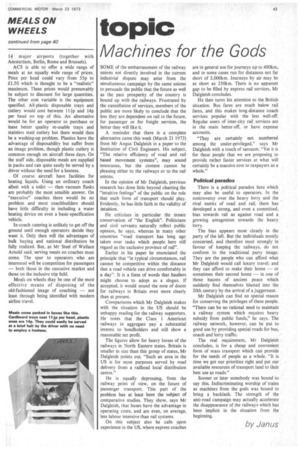topic
Page 41

If you've noticed an error in this article please click here to report it so we can fix it.
Machines for the Gods•
SOME of the embarrassment of the railway unions not directly involved in the current industrial dispute may arise from the simultaneous campaign by the same unions to persuade the public that the future as well as the past prosperity of the country is bound up with the railways. Frustrated by the cancellation of services, members of the public are more likely to conclude that the less they are dependent on rail in the future, for passenger or for freight services, the better they will like it.
A reminder that there is a complete alternative came this week (March 21 1973) from Mr Angus Dalgleish in a paper to the Institution of Civil Engineers. His subject, "The relative efficiency of road and rail based movement systems", may sound innocuous, but the cOntent cannot be pleasing either to the railways or to the rail unions.
In the opinion of Mr Dalgleish, previous research has done little beyond charting the "intuitive feelings" of the public on the role that each form of transport should play. Evidently, he has little faith in the validity of intuition.
He criticizes in particular the innate conservatism of "the English". Politicians and civil servants naturally reflect public opinion, he says, whereas in many other countries "road transport •has long ago taken over tasks which people here still regard as the exclusive province of rail".
Earlier in his paper he enunciated the principle that "in typical circumstances, rail cannot be competitive within the distance that a road vehicle can drive comfortably in a day". It is a form of words that hauliers might choose to adopt as a slogan. If accepted, it would sound the note of doom for railways in Britain even more clearly than at present.
Comparisons which Mr Dalgleish makes with the situation in the US should be unhappy reading for the railway supporters. He notes that the Class. 1 American railways in aggregate pay a substantial interest to bondholders and still show a reasonable net profit.
The figures allow for heavy losses of the railways in North Eastern states. Britain is smaller in size than this group of states, Mr Dalgleish points out. "Such an area in the US is for most purposes served by road delivery from a railhead local distribution centre."
He is equally depressing, from the railway point of view, on the future of passenger transport. This part of the problem has at least been the subject of comparative studies. They show, says Mr Dalgleish, that buses have the advantage in operating costs, and are even, on average, less labour intensive than rail systems.
On this subject also he calls upon experience in the US, where express coaches are in general use for journeys up to 400km, and in some cases run for distances not far short of 2,000km. Journeys by air may be as short as 250km. There is no apparent gap to be filled by express rail services, Mr Dalgleish concludes.
He then turns his attention to the British situation. Bus fares are much below rail fares, and this makes long-distance coach services popular with the less well-off. Regular users of inter-city rail services are in the main better-off, or have expense accounts.
"They are certainly not numbered among the under-privileged," says Mr Dalgleish with a touch of sarcasm. "Yet it is for these people that we are proposing to provide rather faster services at what will certainly be a massive cost to taxpayers as a whole."
Political paradox
There is a political paradox here which may also be useful to operators. In the controversy over the heavy lorry and the rival merits of road and rail, there has developed a strong, and even a committed, bias towards rail as against road and a• growing antagonism towards the heavy. lorry.
The bias appears most clearly in the• party of the left. But the individuals mostly concerned, and therefore most strongly in favour of keeping the railways, do not conform to the traditional party image. They are the people who can afford what Mr Dalgleish would call luxury travel; and they can afford to make their home — or sometimes their second home — in one of those haunts of ancient peace which suddenly find themselves blasted into the 20th century by the arrival of a juggernaut.
Mr Dalgleish can find no special reason for conserving the privileges of these people. "There can be no rational need to maintain a railway system which requires heavy subsidy from public funds," he says. The railway network, however, can be put to good use by providing special roads for bus, coach and lorry traffic.
The real requirement, Mr Dalgleish concludes; is for a cheap and convenient form of mass transport which can provide for the needs of people as a whole. "It is time we got our priorities right and put our available resources of transport land to their best use as roads."
Sooner or later somebody was bound to say this. Indiscriminating worship of trains as machines from the gods was bound to bring a backlash. The strength of the anti-road campaign may actually accelerate• the disappearance of the railways which has been implicit in the situation from the beginning.
by Janus












































































































